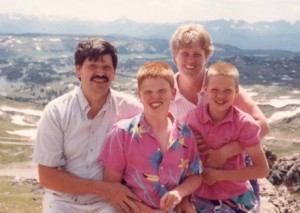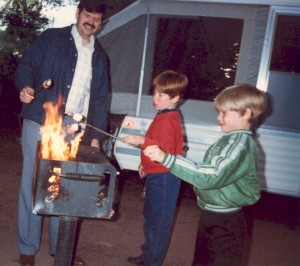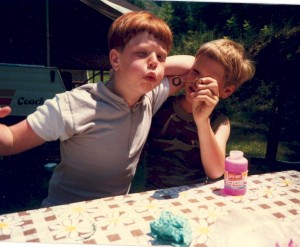Hi Everyone. Are you getting ready for a vacation? I thought you might like to read about the family trip that changed our lives.
Oh, Beautiful for Spacious Skies…
From the moment I was pregnant, my husband Tom dreamed of the day he could retrace his childhood trip out west. He glowed in the memories of mom, dad, and kids studying the maps on the kitchen table, packing the lunch meat sandwiches in the cooler, and repeating the rest-stop conspiracy of Dad throwing the baseball high over his boys’ heads so they would chase the ball and use up some of that stored energy. The year our son Aaron was ten and his brother Tommy turned nine, faithful to Ulrich family tradition, we headed west.
The main difference between my husband’s family, and ours, was Aaron has autism.
Preparing for the trip
Aaron didn’t start walking until he was five, and at ten was not completely independent in the bathroom. So how were we going to follow his needed routines for toileting, understand Aaron’s wants without the use of words or signs, watch his balance issues, and especially, cope with unpredictable behaviors? How were we going to manage twenty-one days of camping, sleeping, eating, and interacting with strangers in strange places? How were we going to survive–much less enjoy–visiting eleven National Parks and Monuments, twelve states, Mexico, and traveling five thousand miles?
Certainly, we were not the first family to attempt a Western vacation with a child with complex needs, but we also knew we were not going to be “typical” tourists. Tom and I briefly considered leaving Aaron with a friend or in summer camp, but we decided this dream vacation included our “whole family.” We would make it work.
Adaptations and Accommodations
Using our teaching and parenting skills, we designed adaptations and accommodations for the trip. In previous years we camped in state parks and all shared a big tent. Aaron had a terrible time sleeping on the ground in such close quarters and often our sleeping bags got soaked in rainstorms, so for this adventure, we decided to buy a pop-up camper.
Our pediatrician recommended some medication to help Aaron relax and sleep at night. We planned to follow Aaron’s schedule for meals, breaks, and sleep. We would only visit restaurants at non-peak hours, choose corner tables, avoid long waits, and skip most museums. We installed a child-proof lock on the car door and had a suitcase of games, music, and snacks. Tommy and Aaron’s jobs on the trip were to crank up the camper each night and help carry the water buckets — jobs that were successful in our previous trips.
Oh, Beautiful for Pilgrim Feet…
Like the pioneers of old, and Tom’s family a generation earlier, at dawn our family set out from Cincinnati with Tommy’s version of a “Colorado or Bust” sign taped to the windshield, driving not oxen-pulling-a-Prairie-Schooner, but a brown-station-wagon-pulling-a-pop-up-camper. We were confident we could handle any challenges we knew would come. We would enjoy our family time and see the beauty of America. Fortunately, instead of mud and rock trails we had interstate roads and could travel at sixty MPH.
We Americans like to brag about being the melting pot and/or salad bowl of the world, a nation that values brotherhood and diversity.
Even with our best preparation, instead of a three-week vacation, this became a three-week teaching excursion. It seems the human America was not quite ready for us.
At home we were surrounded by people who knew us; they saw the beauty in Aaron and our family. With the strangers we met on our journey, we had both negative and positive interactions.
Transformational Experiences, day after day
As if we had a disease, one family packed up their tent and moved it to a site on the other side of the campground, and a pregnant woman crossed the street so she wouldn’t have to pass us.
One evening Aaron was enjoying the loud echoes he could make in the campground bathhouse, and a young boy ran out screaming, “The Hulk, the Hulk’s in there!”
An elderly man said, “We have one of ‘those’ in our family but he doesn’t travel, he lives in a home.”
“Mom, what’s wrong with that boy? Does he act that way on purpose?” The mother whispered, “SHHH, he’s retarded,” and like we were dangerous, yanked the child’s arm and dragged him away.
“Have you tried the Feingold or gluten-free diet?” or, “I know an allergist in Illinois who can get kids like that to talk.” It seems many people think they have the right to offer advice. I am sure they think they are helping, but do they really think we were so desperate we needed a consultation standing in line at the grocery? We struggle with the question: Can Aaron ever be accepted just the way he is, or does he only have value if he is “fixed” or “cured”?
In Arizona, we were asked to leave a family-style restaurant because, as the manager said, “We don’t serve people like him.” Tom and I were shocked because Aaron was happily eating his pancakes. If he had been noisy or disruptive we would have understood but he was acting as normal as anyone. Sobbing, I hurried Aaron to the car wondering what we were going to do a thousand miles from home. I realized this was the lowest point of the trip and saw a glimpse of the discrimination that has followed individuals of other ethnic and racial groups. The stigma of being asked to leave a restaurant because some anonymous person didn’t like the way my son “looked,” and the management’s open prejudice presented an uncomfortable dark side of America I will never forget.
Oh, Beautiful for Heroes Proved…
Our trip would have been devastating if only bad things happened, but we actually had some very positive experiences.
People would ask with smiles, “Where are you from?”, “Where did he get that red hair?” or “How old is he?” Just ordinary questions, but kind gestures and communication starters.
A parent of a child with Down syndrome commented, “I hope the programs in Ohio are better than in Missouri.”
One young girl smiled at us, “We have special kids in our school. My best friend’s name is Brian, he reminds me of him.”
Several children sought seats next to Aaron and Tommy on a park swing, maybe just for a closer look, but they made eye contact and tried to make Aaron smile. Several gently pushed Aaron on the playground swings, and merry-go-round, and gave him a turn kicking the soccer ball.
Aaron pinched me when we were rocking violently on a small plane sight-seeing ride over the Grand Canyon, the pilot said: “Don’t worry, I’ve had grown men reach over and hold my arm.”
At one roadside park, all the visitors collectively held their breath as Aaron climbed the steps up a steep slide. Tommy guided him to the top where after much arm-flapping and nervous hand-biting Aaron finally let go. As the wind struck his face and he barreled down the slide Aaron’s expression was one of absolute joy. Everyone in the park clapped and cheered. This was not just a glorious moment for Aaron; this was a glorious moment for every person in the park.
In a swimming pool in Arizona, a lifeguard got in the water during her break and showed Aaron how to swim on his back.
On a train ride in Silverton, CO a little girl moved into the seat next to Aaron and taught him an adapted version of the game Connect Four.
A waiter in Mexico brought Aaron an extra pack of crackers while we waited for our meal and tried to entertain him by singing Old McDonald in broken English. He even helped cut up Aaron’s food. His empathy and understanding crossed national and language barriers.
Universal Design and Inclusion
In the National Parks, we found many examples of universal design: accessible water fountains, paved paths, and self-guided tours enabled us to partially participate in the park activities. Several of the campground managers gave us campsites close to the restrooms. At Carlsbad Caverns, New Mexico there were benches and a bypass for the steep climbs. A small work crew with disabilities in Grand Canyon National Park did yard work, and a waitress at Canyon De Chelly used sign language to take an order from a customer. These inclusive accommodations not only made it easier on us, they actually made us feel welcome.
Survival means Adapting to the Environment
We were ambitious. We flew above the Grand Canyon and went down into the caves of New Mexico. We had a lovely lunch at the Broadmore Hotel with water goblets and doilies but were asked to leave a family-style restaurant. We drove to the top of Pike’s Peak and the whole family climbed the ladders of Mesa Verde’s Cliff Palace. We saw Native Americans adapt and survive their desert environment by seeing the value of every living plant and creature. We tasted jelly and saw sewing needles made from a cactus. We heard wolves howling, and we howled back singing every song we knew around the campfire. We took pictures and made memories that will last a lifetime. And perhaps like the Native Americans who live in the desert, we were learning how to adapt to our environment.
Lessons from the Road
We were physically and emotionally exhausted. Many amazing things happened that brought our family closer together. At the same time, though, I feel Tom, Tommy, Aaron and I crossed the line.
We could no longer think of ourselves as a family with one member who happened to have a disability; we were truly a “disabled family.”
I am not trying to be shocking or dramatic. We just had to concede that most of the general public did not seem to have the motivation, information or skills to assimilate us into their version of a “typical family.”
We also learned we had no anonymity; we stood out even in the largest group. Five hundred people came to see the bats fly out of Carlsbad Caverns, but because of Aaron’s shout when the bats emerged; four hundred ninety-nine people were looking at us.
We learned that celebrating the diversity of the landscape of America includes seeing the beauty of the diversity of its people.
Planting Apple Seeds
Our experiences reinforced our commitment to the inclusion of people with disabilities to live, work, recreate, and go to school with their neighbors, brothers, and sisters. We cherished the positive experiences; the children we met gave us so much hope for the next generation of Americans and travelers. Like Johnny Appleseed on his trips out west, we tried to drop positive seeds that other pioneer families would nurture and see bear fruit. Perhaps a future Kodak moment for our country will include not only the beautiful American landscapes but also people like Aaron and our family.
Better than “The Buck Stops Here”
One last story: In Missouri, inside the Truman Memorial Museum with its high ceilings and big rooms, Aaron started, “vocalizing.” Oh, how it echoed. The guard approached us and said Aaron needed to be quiet or leave. Tom began to go when another tourist came running from across the room. He looked the guard in the eye and said, “How dare you speak to them like that. That young man is a citizen of this country and has a right to be here. Harry Truman was a strong supporter of the ordinary person. He, of all people, would want them to be here.”
As we pulled the car into our driveway, Tom and I wondered if it was worth it. Would we ever take another road trip? But like always, our children showed us the way. As Tommy ran into the house to be the first person in the bathroom, he called over his shoulder, “Next year I want to go to Florida!”
And crown thy good with brotherhood, from sea to shining sea!
Keep Climbing: Onward and Upward
All the best,
Mary
–
Copyright Ulrich 2000-2024
Original Work do not copy without Permission



